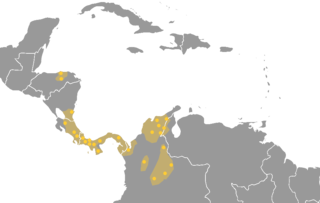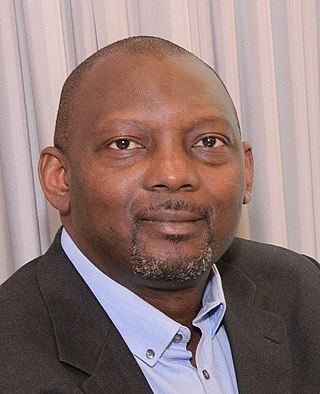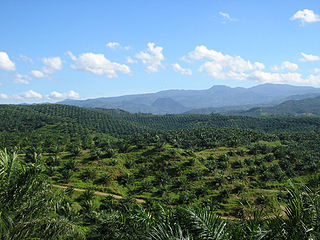Related Research Articles

Palm oil is an edible vegetable oil derived from the mesocarp of the fruit of oil palms. The oil is used in food manufacturing, in beauty products, and as biofuel. Palm oil accounted for about 36% of global oils produced from oil crops in 2014. Palm oils are easier to stabilize and maintain quality of flavor and consistency in ultra-processed foods, so they are frequently favored by food manufacturers. Globally, humans consumed an average of 7.7 kg (17 lb) of palm oil per person in 2015. Demand has also increased for other uses, such as cosmetics and biofuels, encouraging the growth of palm oil plantations in tropical countries.

The Goldman Environmental Prize is a prize awarded annually to grassroots environmental activists, one from each of the world's six geographic regions: Africa, Asia, Europe, Islands and Island Nations, North America, and South and Central America. The award is given by the Goldman Environmental Foundation headquartered in San Francisco, California. The Prize is often referred to as the green Nobel.

The U'wa are an indigenous people living in the cloud forests of northeastern Colombia. Historically, the U'wa numbered as many as 20,000, scattered over a homeland that extended across the Venezuela-Colombia border. Some 7-8,000 U'wa are alive today.

Seacology is a nonprofit 501(c)(3) charitable organization headquartered in Berkeley, California, that works to preserve island ecosystems and cultures around the world. Founded in 1991, it began with the work of ethnobotanist Paul Alan Cox, who researched tropical plants and their medicinal value in the village of Falealupo in Samoa during the mid-1980s. When the villagers were pressured into selling logging rights to their rainforest in 1988 to build a new school, Cox and his wife offered to help secure funds for the new school in return for an agreement with the villagers to protect their forest. With the help of his friends and family, Cox secured the funds within six months, later earning him and the village chief, Fuiono Senio, the Goldman Environmental Prize for their efforts. Word spread throughout the islands, and with increasing demand for similar projects, Cox, along with Bill Marré and Ken Murdock, decided to form Seacology and expand their work internationally. For the first few years, the organization operated on a volunteer basis.
Jean La Rose is an Arawak environmentalist and indigenous rights activist in Guyana. She was awarded the Goldman Environmental Prize in 2002 for her work to halt mining in their territories, to secure inhabitants full rights to traditional lands, and to save Guyana's forests.

Berito Kuwaru'wa is a member of the Colombian U'wa people. He was awarded the Goldman Environmental Prize in 1998 for his role as spokesperson in conflicts between the U'wa people and the petroleum industry.

Pablo Fajardo Mendoza is an Ecuadorian lawyer and activist. He led the litigation against Chevron Corporation related to the environmental disaster he alleged was caused by the oil operations of Texaco in the Lago Agrio oil field between 1964 and 1990. In this process, Fajardo represented the over 30,000 local inhabitants affected by the spill of crude oil and toxic waste. Chevron, which instead blames Petroecuador and has not paid the judgement, has had repeated success in arguing against it. The judgement has been validated by further Ecuadorian courts and the Supreme Court of Canada but it has been declared fraudulently obtained by the United States District Court for the Southern District of New York and an arbitration court in The Hague.

The Environmental Justice Foundation (EJF) is a non-governmental organisation (NGO) founded in 2000 by Steve Trent and Juliette Williams that works to secure a world where natural habitats and environments can sustain, and be sustained by, the communities that depend upon them for their basic needs and livelihoods. It promotes global environmental justice, which it defines as “equal access to a secure and healthy environment for all, in a world where wildlife can thrive alongside humanity.”
Wilmar International Limited is a Singaporean food processing and investment holding company with more than 300 subsidiary companies. Founded in 1991, it is one of Asia's leading agribusiness groups alongside the COFCO Group. It ranks amongst the largest listed companies by market capitalisation on the Singapore Exchange (SGX), being the second largest as of September 2010. It was ranked 211th in the Fortune Global 500 list in 2020. It was ranked 3rd in the World's Most Admired Company by Fortune in 2019.
The Rainforest Foundation UK (RFUK) is a non-profit NGO working in Africa and South America. It is one of the first international organizations to support the indigenous peoples of the world's rainforests in their efforts to protect their environment and fulfill their rights to land, life and livelihood. The Foundation aims to protect rainforests by securing the land rights of indigenous peoples and other forest-dependent communities. It also campaigns internationally on issues such as industrial logging, climate change, agricultural expansion and nature conservation.
Odigha Odigha is a Nigerian educator, environmentalist and activist. He is the founder of Nigeria NGO Coalition for the Environment. He was awarded the Goldman Environmental Prize in 2003, for his efforts on protection of the rainforests of Cross River State from industrial logging. According to Grist News, he said, "If you fight and run away, you'll live to fight another day. If you die in this struggle, your struggle may not continue." Odigha's focus was on the protection of the Cross River rainforest and on sustainable development for rainforest communities which began since 1994.

Samuel Nguiffo is a Cameroonian lawyer. He is manager of the Center for Environment and Development in Yaoundé. He was awarded the Goldman Environmental Prize in 1999, for his efforts on protection of the tropical rainforests of Central Africa.
Silas Kpanan'Ayoung Siakor is a Liberian environmentalist. He was awarded the Goldman Environmental Prize in 2006, for his revealing of illegal logging in Liberia and its connection to the civil war, leading to export sanctions from the United Nations Security Council.

Palm oil production is important to the economy of Indonesia as the country is the world's biggest producer and consumer of the commodity, providing about half of the world's supply. In 2016, Indonesia produced over 34.6 million metric tons of palm oil, and exported 25.1 million metric tons of it. Oil palm plantations stretch across at least 12 million hectares. There are several different types of plantations, including small, privately owned plantations, and larger, state-owned plantations. There are a variety of health, environmental, and societal impacts that result from the production of palm oil in Indonesia. A recent publication by the NGO Rainforest Action Network (RAN) indicates that the use of palm oil by some of the biggest chocolate and snacks' producers is increasing this problem.

Rudi Putra is an Indonesian biologist who received a Goldman Environmental Prize in 2014 for his efforts to combat illegal logging, forest encroachment for palm oil production, and policies that open endangered ecosystems to mining and plantation industries.
Nemonte Nenquimo is an Indigenous activist, author and member of the Waorani Nation from the Amazonian Region of Ecuador. She is the first female president of the Waorani of Pastaza (CONCONAWEP) and co-founder of the Indigenous-led nonprofit organization Ceibo Alliance. In 2020, she was named in the Time 100 list of the 100 most influential people in the world, the only Indigenous woman on the list and the second Ecuadorian to ever be named in its history. In recognition of her work, in 2020 the United Nations Environment Programme gave her the "Champions of the Earth" award in the category Inspiration and Action.
Chima Williams is an environmental activist, an environmental lawyer who fights environmental injustice and held a multinational company like Shell to pay for damages they have caused and inflicted on some communities in the Niger-Delta. He is also the founder of the first Student environmental justice group in Nigeria. He was named the Earth's foremost defenders.
Alexandra Narváez Trujillo is an Ecuadorian scientist and Indigenous leader who advocates for the protection of her community's lands and cultures. She is a professor at the School of Biological Sciences at the Pontifical Catholic University of Ecuador, where she has conducted research on the bioactivity of Ecuadorian fungal endophytes. In addition to her scientific career, Narváez is an Indigenous leader and activist in Ecuador, and has played a crucial role in her community's efforts to defend their rights to land and cultural survival in the Amazon rainforest. She has received numerous awards and honors for her contributions to science and Indigenous activism, including the 2022 Goldman Environmental Prize.
Paul Sein Twa is a Karen environmentalist and indigenous activist from Myanmar who works to preserve the culture and environment of the Salween River basin. He co-founded the Karen Environmental and Social Action Network (KESAN) in 2001 to help Karen indigenous communities the preservation and protection of their land and heritage. He received the Goldman Environmental Prize in 2020 for his efforts.
Delima Silalahi is an environmental activist from North Tapanuli, Indonesia, known for her efforts in safeguarding customary forests and Indigenous rights in North Sumatra. As the executive director of the NGO Kelompok Studi dan Pengembangan Prakarsa Masyarakat (KSPPM), she orchestrated efforts to reclaim over 17,000 acres of tropical forest that had been converted by a pulp and paper company.
References
- 1 2 3 "Palm Oil Development Leaves Liberians Poorer, says Winner of 'Green Nobel'". VOA. Retrieved 1 May 2019.
- ↑ "Alfred Lahai Gbabai Brownell – Human Rights Defenders World Summit 2018" . Retrieved 1 May 2019.
- ↑ "Liberian lawyer wins top environment award". BBC Worldservice Newsday. 29 April 2019.
- 1 2 "Palm oil development leaves Liberians poorer, says winner of 'Green..." Reuters. 29 April 2019. Retrieved 15 May 2019.
- ↑ Blair, Graeme (2009). "Governance Traps Interview no. E2: Alfred Brownell" (PDF). Princeton University. Retrieved 30 June 2024.
- ↑ "Natural Resources and Economic Development in Africa: Liberian Experience featuring Alfred Brownell". African American Institute. Retrieved 15 May 2019.
- 1 2 Hernandez, Alina (29 April 2019). "Liberian lawyer and Tulane law alum wins prestigious global environmental prize". Tulane University.
- 1 2 "'There's no way I'll be silenced'". news.northeastern.edu. Retrieved 15 May 2019.
- 1 2 "How challenging the powerful global palm oil industry forced a Liberian lawyer into exile". finance.yahoo.com. Retrieved 6 May 2019.
- ↑ "STATEMENT ON ALFRED BROWNELL." States News Service, 15 May 2019. Gale Academic OneFile, link.gale.com/apps/doc/A585564677/AONE?u=wikipedia&sid=ebsco&xid=989cfcb3. Accessed 23 Dec. 2022.
- ↑ Bukola Adebayo. "Lawyer wins Goldman Prize for risking his life to protect Liberia's forests". CNN. Retrieved 15 May 2019.
- 1 2 Watts, Jonathan (29 April 2019). "Lawyer forced to flee Liberia hopes to return after Goldman prize win". The Guardian. ISSN 0261-3077 . Retrieved 6 May 2019.
- ↑ Callahan, Molly (25 October 2018). "'They made a big mistake when they drove me out of Liberia'". News@Northeastern. Northeastern University . Retrieved 5 May 2019.
- ↑ "Alfred Brownell". Yale Law School. Retrieved 30 June 2024.
- ↑ "Liberian Activist Alfred Brownell Wins 2019 Goldman Environmental Prize".